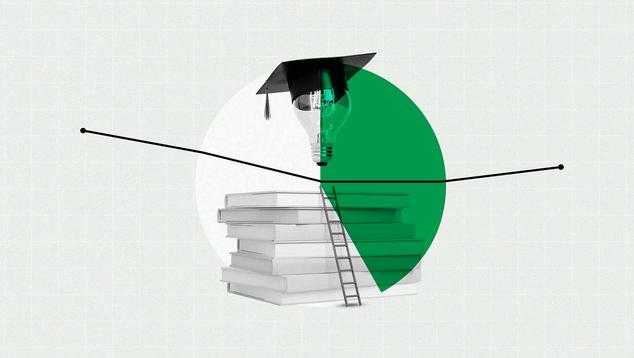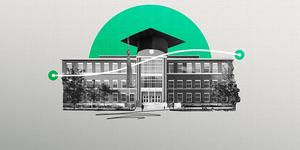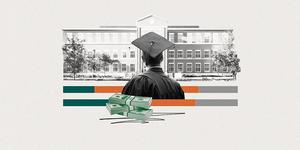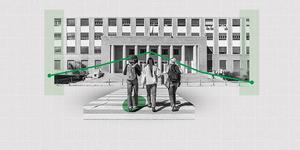Story Highlights
- 42% confidence rating is up from 36% in 2023 and 2024
- Americans are more confident in both four- and two-year colleges
- More cite quality, innovation as reasons for being confident
WASHINGTON, D.C. — Americans’ confidence in higher education has increased, with 42% saying they have “a great deal” or “quite a lot” of confidence in it, up from 36% in each of the past two years. At the same time, the share with little or no confidence has declined from 32% a year ago to 23% today.
This represents the first time Gallup has measured an increase in confidence in its decadelong trend. Confidence in higher education remains well below where it was in the initial Gallup measure in 2015, when a majority of 57% were confident.
The results are based on a Lumina Foundation-Gallup education survey, conducted by telephone June 2-26 with a sample of 1,402 U.S. adults, including larger samples of Black and Hispanic Americans. Confidence among Black and Hispanic Americans is slightly above the national average, at 49% and 50%, respectively.
Increased confidence in higher education since last year is seen among most societal subgroups, including college graduates (up six percentage points to 48%) and those without a four-year college degree (up seven points to 40%). The major U.S. political party groups show similar increases, with Democrats up five points (to 61%) and independents and Republicans up six points each (to 41% and 26%, respectively). Most of the decline in higher education confidence over the past decade had occurred among Republicans.
Confidence in Both Two-Year and Four-Year Institutions Is Up
Gallup and Lumina explored more in-depth questions about U.S. views of higher education in a June 2-15 web survey, using the Gallup Panel. That survey, also conducted in 2024, measured Americans’ confidence in two-year and four-year colleges, separately.
Similar to the increase in confidence in higher education, generally, more Americans are confident today than a year ago in both four-year colleges (up 11 points, to 44%) and two-year colleges (up eight points, to 56%).
All party groups are more confident in four-year institutions than they were last year, with increases around 10 points for each subgroup. Still, significant party gaps remain: 66% of Democrats, 40% of independents and 26% of Republicans are confident in four-year colleges.
Confidence in two-year institutions has increased more among Republicans (up 12 points) than independents (6 points) and Democrats (no meaningful change). Party gaps in confidence in two-year colleges are smaller than the gaps for four-year institutions because Republicans and independents are significantly more confident in two-year than four-year colleges. Democrats now have similar confidence in each type of institution.
High Confidence Tied to Value of Education, Training and Quality
After indicating whether they are confident in higher education, generally, respondents were asked to give reasons for their views. Broadly speaking, Americans who are confident in higher education cite the benefits of knowledge for young people, the training it provides, the quality of U.S. higher education and the opportunities it provides to graduates.
Compared with last year, more people — 12%, up from 5% — who are confident in higher education mention the innovations that come from it. There has also been a doubling to 14% in the percentage who say that U.S. colleges are some of the best in the world. Fewer Americans than last year (16%, down from 24%) mention the opportunities higher education provides for graduates as a reason for their confidence in the institution.
Most people who are not confident in higher education mention political stances or agendas, colleges not preparing students well for the workforce, and the cost of college as reasons for their view. Compared with 2024, more of those lacking confidence in higher education discuss political agendas (38%, up from 28%) or are critical of the way colleges are run (12%, up from 3%). Fewer critics of higher education mention its cost than did so a year ago (24%, down from 35%).
When all respondents, including those who are currently confident in higher education and those who are not, were asked what would make them more confident in higher education, the responses largely echo the chief complaints about it. These include focusing instruction on practical career and job skills, lowering tuition and costs, and eliminating politics and political bias from the classroom.
Americans Largely See Higher Education Benefits to Society, Individuals
Majorities of Americans agree that higher education accomplishes many of the personal and societal benefits its advocates claim it does. About three-quarters of U.S. adults agree that higher education leads to greater innovation and discovery, while 69% say it results in better jobs and career advancement for individuals, and 66% say it promotes higher household incomes.
Smaller majorities say higher education makes the population more knowledgeable, that it gives the U.S. a competitive advantage over other countries, and it leads to more entrepreneurship and business creation. One area where Americans are more skeptical about higher education is in fostering tolerance and compassion for others — 45% agree and 37% disagree that it does.
As would be expected, Americans who are confident in higher education are much more likely to believe that it helps generate these positive outcomes. The differences between those confident and not confident range from as little as 24 points for greater innovation to as much as 50 points for fostering greater compassion and tolerance.
Generally speaking, U.S. adults with a four-year college degree are much more inclined to believe higher education accomplishes these goals than are U.S. adults who attended college but did not receive a bachelor’s degree or did not attend college at all.
There are also party differences, with Democrats more likely than independents and Republicans to believe higher education helps U.S. society in these positive ways.
Bottom Line
After worsening over the past decade, Americans’ confidence in higher education showed a modest reversal in that trend this year. The improved outlook has occurred across most societal subgroups. At a time when higher education confidence is improved but remains below the majority level, solid majorities of Americans still believe that higher education benefits individuals and society in a variety of ways, particularly by increasing knowledge, innovation and prosperity.
Even after the longer-term decline in confidence in higher education, it still rates among the most positively rated U.S. institutions, behind only small business, the military and the police. This is partly because other institutions, like higher education, have also seen an erosion of confidence in recent years.
Stay up to date with the latest insights by following @Gallup on X and on Instagram.
Learn more about the Lumina Foundation-Gallup 2025 State of Higher Education Study.





